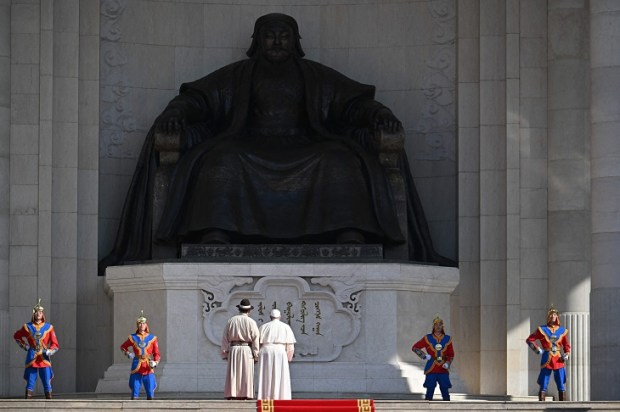This weekend I have been touring TV studios trying to set the late Pope Benedict’s life and work in perspective. Clearly, he was a man of enormous accomplishment: theologian at the Second Vatican Council, Archbishop in his native Bavaria, Prefect of the Congregation for the Doctrine of the Faith, Cardinal, Pope, and an author so prolific that even George Pell has admitted to having had difficulty keeping up with all his erudite writings.
Yet Benedict’s life was also something of a paradox, as I have pointed out elsewhere. He was the consummate conservative intellectual who ended up radicalising the papal constitution; a stern enforcer of theological orthodoxy who was happiest playing Mozart on the piano with a stray feline by his side.
Benedict, the Pope with the sharpest eye for beauty in decades, and a great reviver of fabulous papal fashions, was also spectacularly bad at protecting and advancing his image in the face of almost relentless media hostility. Certainly, compared to the showmen John Paul II and Francis, who preceded and succeeded him, he could not crack the formula.
Eulogies for Benedict have been slow to acknowledge this point – and understandably so, for no one should revel in talking ill of the recently dead. And yet, a full assessment of Benedict’s life and legacy has to begin with such an observation, however unfair it may seem to be.
Benedict himself would have understood the unfairness – but also the importance of not sweeping the reality of the situation under the carpet. After all, who was treated more unfairly than Christ, the man for whom he proclaimed his love with his last dying breath? And Benedict never had his reputation wrecked to quite the same extent as has befallen Pius XII, ‘Hitler’s Pope’ – a similarly diffident figure who could probably never have stood up to the Nazis with enough courage and recklessness to satisfy his many critics, and has been condemned to lasting opprobrium far more surely than Benedict because of that.
Yet correspondences I have had from pious Catholics since Benedict’s passing have tended to see even acknowledgment of Benedict’s troubled PR and the damage it did to the Catholic Church as partisan, wrongheaded, and disloyal. I find it hard to believe that this is what Benedict himself, a philosophical stickler for the truth, would have wanted. Only by recognising the problems of his pontificate – of which some were indeed self-inflicted wounds – can we begin to see his historic significance. And in my view, as an historian, he will prove to have been every bit as major a figure in the Church’s history as John Paul, Francis, or any 21st century Pope for these reasons.
First, Benedict made a mark on the Church as a theologian which far exceeds his contribution as pontiff. His ideas about the absoluteness of truth – his famous aphorism, that truth is not determined by majority vote – have become a counter-cultural clarion call in these times of postmodernist Woke. His was a philosophy which drew on the Enlightenment and on recourse to reason – an approach which Western elites increasingly reject in favour of emotion: ‘our truth’ versus ‘your truth’ to borrow from the Meghan Markle lexicon.
Second, by reviving an appreciation for Catholicism’s aesthetic dimension, Benedict inspired thousands to love the liturgy and to find God’s perfection in its sacramental arcana. This will not disappear just because Francis has now tightened the criteria for priests to be allowed to say the mass in Latin. Indeed, look at how priests and bishops are defying him the world over even now.
Third, simply by resigning as Pope, Benedict did something extraordinary. Ever since people have cited his action as the first in 600 years – but it was far more than that. Medieval papal resignations were not generally voluntary renunciations of power by those who recognised that they could no longer wield it effectively. And the one which may have been, that of Celestine V in 1294, ended with that Pope brutally murdered by his successor.
By resigning and retiring, Benedict has normalised something hitherto extraordinary. None of us would think it especially remarkable for Francis now to follow suit. But Benedict, via his resignation, has also raised profound questions about what it means to be Pope, what the source of papal power is, and how far the papal magisterium extends if it can be renounced so readily. No one, not even Benedict himself, has yet produced compelling answers to those questions.
The irony, perhaps even tragedy, of Benedict’s papacy is that there was such a disconnect between who he was and how society at large perceived him: between the shy, gentle man who genuinely just wanted to be a university professor and the socially awkward, politically naïve pontiff whom many non-Catholics thought to harbour a touch of the Bond villain about him.
As an historian, I need to acknowledge that Benedict was both of those constructs. And also that he did not always help himself. His 2006 Regensburg lecture, in which his derogatory quotation about Islam taken from the Byzantine emperor Manuel II Palaeologus caused uproar, was a fiasco which any savvy advisor – or a less otherworldly pontiff – should have seen a mile off. Similarly, he might have disarmed criticism of his youthful, and entirely coerced, participation in the Hitler Youth if he had simply said it was wrong, he had been weak not to have resisted from outset, he was sorry.
Instead, he gave fuel to his enemies by allowing others to speak for him and to offer exculpatory excuses which a critic could certainly judge as morally relativistic. Not a good look for the man who denounced the ‘dictatorship of relativism’. This phrase may have been intended to critique Adorno, Horkheimer, and Marcuse for their rejection of truth but their real goal – as Benedict knew – was to deconstruct not only truth but also morality. By allowing his own moral choices to be presented relativistically Benedict arguably risked a charge of hypocrisy and undercut the force of his arguments overall.
Yet the more important point is this: Benedict’s argument was right and the Frankfurt School was wrong, on questions of truth at least. That alone is likely to see him emerge as a compelling and influential thinker for the next generation who wish to push back against current elite pieties and orthodoxies.
Joseph Ratzinger, the guardian of traditional Catholic orthodoxies and last pillar against Liberation theology, might allow himself an ironical smile at that. He would deserve it. May he rest in peace.
Miles Pattenden is Senior Research Fellow in Medieval and Early Modern Studies at the Institute for Religion and Critical Inquiry, Australian Catholic University.

























